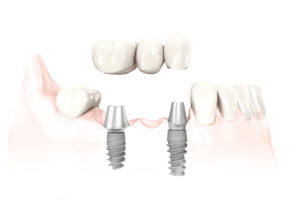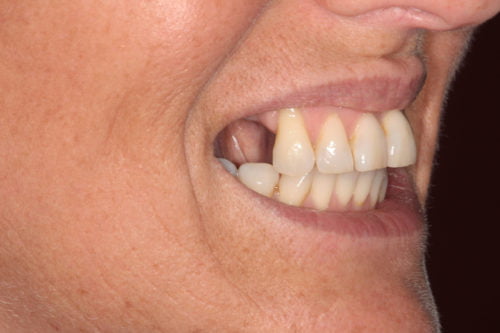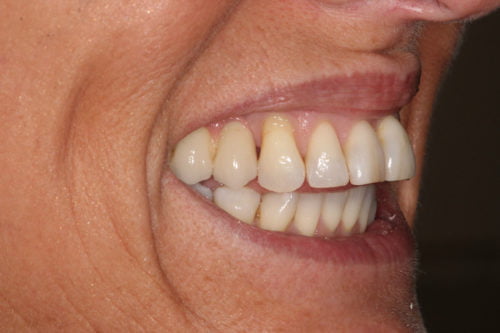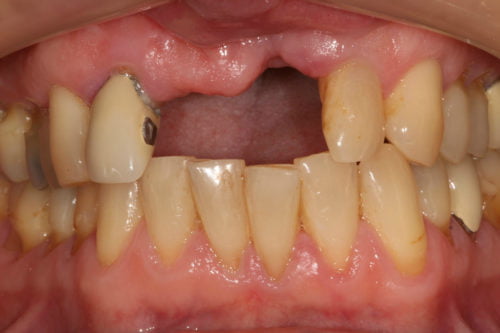Replacing Multiple Teeth
Get your smile back
Dental implants are a long-term solution to replace multiple missing teeth. Whether you have a few single gaps in your mouth or if you have a larger gap where several teeth once were, we can use one, or two or more implant supported restorations to conceal the gaps. In cases where several teeth are missing in a row, we can use implants to support a bridge carefully designed to match the colour and shape of your natural teeth.
The difference that dental implants can make on your sense of wellbeing is significant, with many of our patients noticing an increase in self-esteem and self-confidence, smiling more and feeling more at ease in social situations. Functionally and aesthetically it can be as close to having your natural teeth as possible — often our patients forget precisely which teeth are supported by dental implants and which are natural.

Clinical expertise in advanced dental implant techniques
We have more than two decades of experience in the placing and restoration of dental implants and have an impressive breadth of knowledge in how to successfully help our patients with complex and challenging dental needs. Our specialist led team use some of the most advanced surgical techniques available, coupled with best clinical practice to ensure our patients receive exceptional results.
These techniques are often more complex than placing the implant itself and require a high degree of clinical precision and expertise. Our team is led by Nigel Rosenbaum who is proficient in the use of these surgical methods and has a reputation for using them to successfully manage challenging restorative cases.
Our team will only prescribe solutions or treatments that are appropriate for your case and they will discuss their recommendations with you at length. Use of these and other techniques will be decided upon after detailed consultation, assessment and treatment planning of your individual needs.
Nigel Rosenbaum

Finance options (including 0% finance) available for all dental implant treatments.
Just a few reasons why patients and referring dentists choose us

Multi-specialist
Team

360 Care &
Planning

Digital
Technology

Free On Site
Parking

Advanced
Training Centre

Referral
Centre
Case studies


Before:
Patient had lost a number of teeth, and a considerable amount of the supporting jawbone.
After:
Two implants required to support a three tooth bridge, which also needed 3D bone reconstruction prior to implant placements. Patient had been previously advised that she could not have implants due to loss of bone in jaw.


Before:
Patient had been missing front teeth for a number of years and unfortunately lost a significant amount of the jawbone.
After:
Two implants place to support a fixed implant retained bridge.
Quick Dental Implant FAQs
Aside from the social aspects, the consequences of missing teeth (single or multiple) on your dental health can be significant. Teeth can drift and move position in the mouth to make up for the missing teeth, resulting in a disrupted natural bite, tension headaches as well as difficulties in brushing leaving you susceptible to dental decay, gum disease or oral infections. Associated bone loss in the jaw can also occur during or just after tooth extraction, as well as natural shrinkage of bone in the area where a tooth once was. Often in these circumstances many people rule themselves out of dental implants as a solution, as sufficient bone is crucial to the stabilisation of the implant. At one80 Dental we can help. Find out more.
At one80 Dental we are passionate about dentistry and every member of the team is enthusiastic about it’s potential to improve our patient’s lives. We take a non-judgemental, empathetic and patient-centred approach. We understand that some patients may have had difficult or traumatic experiences with their dental care over the years and that this can have a negative impact on their feelings about dentistry. Everyone at one80 Dental works together to help you to reverse these feelings; we plan your care carefully and purposefully take our time to get to know you and your history, and importantly how we can help you going forwards. We are also one of the only dental practice in the UK to have an in-house dental anxiety management service which works in conjunction with our clinical care.
If the idea of making an appointment with the dentist straight away is too big a step, then we encourage you to just come in and have a free no obligation chat with one of our Treatment Advisors or even with our in-house therapists. The treatment advisors can talk you through possible treatment options and answer any immediate questions. It also gives you an opportunity to see the practice and meet the team.
No. Our patients are often surprised at how little discomfort they experience during and after implant procedures.
The procedures can be carried out using a local anaesthetic to keep your comfortable and sedation is also available if you are concerned about any aspect of the surgery. Our team will take good care of you throughout your treatment and will listen to any worries or concerns you may have.
For routine cases, from the time of implant placement to the time of placing the replacement tooth can be somewhere between 3 – 6 months. In more complex cases involving the replacement of several teeth or bone regeneration, treatment can take longer, with some lasting up to 12 months.
We must take several factors into consideration, for example the quality of your bone, and until you have been fully assessed by our team it is difficult to give an exact timeframe.
At one80 Dental we take a phased approach to our dental implant process. We take a wide view and focus on understanding the bigger picture including how and why you have experienced tooth loss and what we can do to help you both now and in the future. Learn more about our approach to your care, and what you can expect from your dental implant journey at one80 Dental.
Visit our Dental Implant FAQs page for more information.
Patient stories
Get in touch